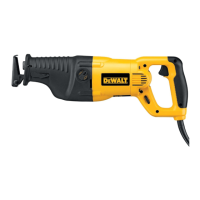5
ENGLISH
Package Contents
The package contains:
1 Reciprocating sabre saw
1 General purpose saw blade
1 Kitbox (K-models only)
1 Instruction manual
Electrical Safety
The electric motor has been designed for one voltage only.
Always check that the power supply corresponds to the voltage
on the ratingplate.
Your
tool is double insulated in accordance
with EN62841; therefore no earth wire isrequired.
If the supply cord is damaged, it must be replaced only by
or an authorised serviceorganisation.
Mains Plug Replacement
(U.K.& Ireland Only)
If a new mains plug needs to be fitted:
• Safely dispose of the oldplug.
• Connect the brown lead to the live terminal in theplug.
• Connect the blue lead to the neutralterminal.
WARNING: No connection is to be made to the
earthterminal.
Follow the fitting instructions supplied with good quality plugs.
Recommended fuse: 13A.
Using an Extension Cable
If an extension cable is required, use an approved 3–core
extension cable suitable for the power input of this tool (see
Technical Data).The minimum conductor size is 1.5mm
2
; the
maximum length is 30m.
When using a cable reel, always unwind the cablecompletely.
Residual Risks
WARNING: We recommend the use of a residual current
device with a residual current rating of 30mA orless.
In spite of the application of the relevant safety regulations
and the implementation of safety devices, certain residual risks
cannot be avoided. These are:
• Impairment ofhearing.
• Risk of personal injury due to flyingparticles.
• Risk of burns due to accessories becoming hot
duringoperation.
• Risk of personal injury due to prolongeduse.
SAVE THESE INSTRUCTIONS
Checking and Changing the Saw Blade
• Only use saw blades conforming to the specifications
contained in these operatinginstructions.
• Only sharp saw blades in perfect working condition should
be used; cracked or bent saw blades should be discarded and
replaced atonce.
• Ensure that the saw blade is securelyfixed.
Additional Safety Instructions for
Reciprocating Sabre Saws
• ALWAYS wear a dust mask. Exposure to dust particles can
cause breathing difficulty and possibleinjury.
• Never switch on the tool when the saw blade is jammed in
the workpiece or in contact with thematerial.
• Keep hands away from moving parts. Never place your
hands near the cuttingarea.
• Use extra caution when cutting overhead and pay
particular attention to overhead wires which may be
hidden from view. Anticipate the path of falling branches
and debris ahead oftime.
• Do not operate this tool for long periods of time.
Vibration caused by the operating action of this tool may
cause permanent injury to fingers, hands, and arms. Use
gloves to provide extra cushion, take frequent rest periods, and
limit daily time ofuse.
Switching On and Off
• After switching off, never attempt to stop the saw blade with
yourfingers.
• Never put the saw down on a table or work bench unless
switched off. The saw blade will keep running briefly after the
tool has been switchedoff.
When Sawing
• When using saw blades specially designed for cutting wood
remove all nails and metal objects from the workpiece before
startingwork.
• Wherever possible, use clamps and vices to fasten the
workpiecesecurely.
• Do not attempt to saw extremely smallworkpieces.
• Do not bend too far forward. Make sure that you always stand
firmly, particularly on scaffolding andladders.
• Always hold the saw with bothhands.
• For cutting curves and pockets, use an adapted sawblade.
Safety Instructions for Reciprocating Saws
• Hold the power tool by insulated gripping surfaces,
when performing an operation where the cutting
accessory may contact hidden wiring or its own cord.
Cutting accessory contacting a "live" wire may make exposed
metal parts of the power tool "live" and could give the operator
an electricshock.
• Use clamps or another practical way to secure and
support the workpiece to a stable platform. Holding the
workpiece by hand or against your body leaves it unstable and
may lead to loss ofcontrol.
h ) Keep handles and grasping surfaces dry, clean and
free from oil and grease. Slippery handles and grasping
surfaces do not allow for safe handling and control of the
tool in unexpectedsituations.
5) Service
a ) Have your power tool serviced by a qualified repair
person using only identical replacement parts. This
will ensure that the safety of the power tool ismaintained.

